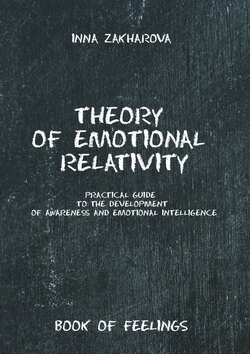Читать книгу Theory of emotional relativity. Practical guide to the development of awareness and emotional intelligence - Inna Zakharova - Страница 4
Self-perception
ОглавлениеHaving been born, the child automatically gets its place in the family system. Satisfying his needs is entire parents’ responsibility. The development level of the child’s personality depends on parental ability to cope with it. All three psychological needs are important. This means that it is important to take care of the child and help him to feel safe, at the same time to give him the opportunity to cope with problems on his own to feel respect for himself, look at him kindly, speak kind words, have tactile contact that the child feels love. On the basis of these attitudes, which determine the attitude towards oneself and the world, the entire emotional sphere of a growing-up child is formed, which comes to life.
Three main patterns:
1. The world is safe. I have all the resources to come over problems. In this case, the need for security will be satisfied by internal resources, a person trusts his feelings and thoughts, fearlessly makes his own decisions regarding his life. This attitude helps to feel calm, confident in a situation of uncertainty. Otherwise, there is a pattern “The world is unpredictable and full of dangers. I don’t have enough strength to cope with it”, it forces a person to seek security at the expense of external resources “If others support me and circumstances will help me, then I can get through them”, then all his decisions are determined by the situation, but he does not rely on his own feelings and thoughts, but on the opinion of significant people who still questioned.
Self-confidence (security)
2. I accept myself as I am. I am interesting and valuable for myself. This internal pattern is a characteristic of those people who love and value themselves, it allows them to be themselves in any situation, and don’t be dependable on the assessment of others, such people calmly remain alone with themselves, privacy for them is an opportunity to stay in company with an interesting person. Otherwise, there is a pattern: “I do not accept myself as I am. I am not interesting and not valuable for myself.” People usually treat themselves in this way and don’t even realize it, carefully hiding their weaknesses, prettifying themselves with external attributes, stories, reinforcing themselves, wanting attention and acceptance from others: “If I’m interesting and attractive to other people, I like myself.” Thus, receiving confirmation that he can be loved. Or “If others do not notice me, if they do not admire me, do not thank me, so I am not good enough for myself”. Such people are most afraid of loneliness, it is perceived as rejection, exclusion.
Self-love
3. I am, I am important, I am significant as an independent unit. This pattern allows a person to feel the strength in himself to influence his life, start significant projects with a challenge, move to his own desires, focus on himself, first of all, be responsible for his decisions and desires. With such a life position, a person decides what to do, but not to think about ideas which help him not to do anything. This is an adult position and adult freedom. The opposite self-perception is: “I don’t feel my own significance and importance, I can’t influence anything.” In this case, it is observed as an aggressive desire to make others respect himself: “If I don’t depend on anyone, people ask for my permission and opinions, listen to me, so I’m an important person”, or total sufferance when a person is absent in his own life and fully under the influence of loved ones: “Anything rather than conflicts”. Having a strong will to compensate the lack of respect for himself, a person seeks external confirmation. If he does not find it, he experiences extremely negative feelings: “If I am dependent on others, people neglect my opinion; my voice does not affect anything, which means I do not consider myself important.”
Self-respect
All three needs are important for each of us, but there are also individual characteristics – their degree of relevance is different. The need, which is of great relevance according to the structure of our personality, is the leading one. Unknowingly, most of our life time we spend on it, sacrificing others. For example, a person who has a leading need for love can be involved in deliberately unsafe situations after the person from whom he wants to receive it. A person with a leading need for respect, wants to feel his own worth and makes himself respect, can sacrifice acceptance, attention, destroying ties with loved ones.
It is the same situation with security. When a person follows this need, he does not make important decisions, as he doesn’t know what they may lead to, and eventually lose his self-esteem.
What is important to remember:
1. Safety, love, respect – basic psychological needs (survival conditions).
2. Prioritization of needs depends on self-perception.
3. The formation of self-perception of the child is the responsibility of the parent.
4. Satisfying the needs and development of a mature personality is the responsibility of its owner.
5. A low level of personality development – a stable negative attitude towards oneself. A high level of personality development is trust, love and self-respect.
